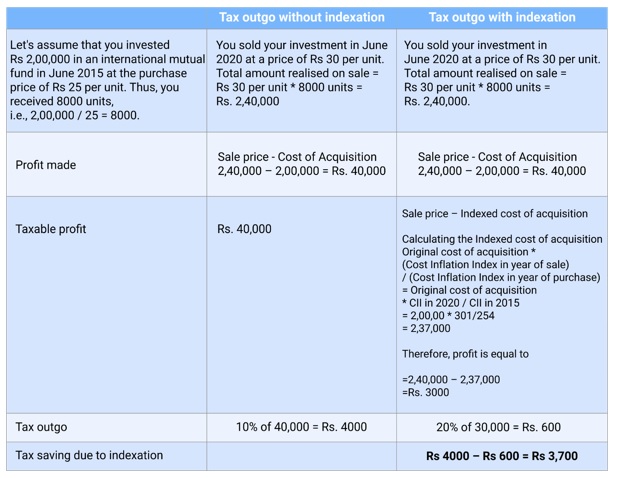
As consumers, we have been more than willing to dip our toes in international waters. Foreign brands and products which used to have a lifestyle appeal have now become an integral part of our everyday lives. Whether it is the Apple iPhone, Starbucks Coffee, or Netflix, global brands have become a favoured part of our daily life. It is time to extend this interest in international products and services to your investments as well. This has been made easy by the availability of international mutual funds in India.
Understanding International Mutual Funds
Before we get to the aspect of tax on international mutual funds and answer your queries on international mutual funds taxation, let us understand these schemes. International mutual funds, also known as global mutual funds, provide investors with the opportunity to invest in companies located outside their home country. These funds invest in a mix of domestic and foreign securities, including stocks and bonds, giving investors access to a wider range of investment opportunities and diversification.
Investing in international mutual funds can be beneficial in several ways. Firstly, it allows investors to access industries and markets that may not be available in their home country. This can provide a more diversified portfolio, which can help to reduce risk and increase potential returns. Secondly, investing in international mutual funds can also provide exposure to economies with different growth rates and economic cycles than the investor’s home country. This can help to mitigate the impact of economic downturns in the investor’s home country. International funds taxation is another important aspect to keep in mind as you need to complete due diligence before investing in international mutual funds.
International mutual funds and their benefits
International mutual funds are pools of money which invest in companies based beyond the borders of their home country. There are two ways in which these funds invest in global equities:
By investing in a pre-existing international fund
By creating a fresh portfolio with a defined objective for investment of investing in international securities and indices
The biggest benefit of investing in international mutual funds is diversification across borders. Diversification as a tool intends to reduce the risk in investing by spreading out the investment pool across different investments. This is a key feature of mutual funds. International funds add another level to diversification by investing in overseas stocks. While geographic diversification helps a portfolio reduce investment risks due to the local market and gives it an edge because of the overseas investment, the benefits don't stop there. International mutual funds give you an opportunity to own the stocks of companies whose products you love to consume. For example, with a fund investing in US stocks, you can own shares in Apple, Starbucks, and Netflix among a host of others.
Read more: How do International Funds work?
How are international mutual funds taxed?
Coming to your question on tax on international mutual funds, international funds taxation is a core part of picking the right scheme as it is essential to understand the tax implications of investing in international mutual funds. International mutual funds taxation depends on whether the fund is an equity or debt fund.
While international mutual funds offer an opportunity for diversification investors should be mindful of the tax implications of investing in such funds. It is important for investors to consult with a tax professional to understand the specific tax implications of investing in international mutual funds based on their residency status and the specific fund they are investing in. You should also understand the tax implications to avoid any surprises at tax time. After all, such schemes can help you reap rich rewards from the movements in global markets but an unwise move could result in heavy taxation on your returns.
Though international mutual funds in India provide access to global equities, they are taxed like domestic debt or fixed income funds. Investments for less than a three-year period are classified as short-term while those beyond that are termed as long-term. Short-term capital gains on these investments are taxed as per your applicable income tax slab. Meanwhile, long-term capital gains attract a tax rate of 20% after providing the indexation benefit.
In order to better understand the tax impact, let's first understand inflation in four simple steps.
- The cost of acquisition is the price that you pay for an investment.
- Indexation adjusts the purchase price of an international fund for inflation.
- If inflation has increased during the holding period, then it increases the purchase price of the fund which reduces the capital gains, thus reducing the tax liability.
- The inflation rate used for this purpose is the Cost Inflation Index (CII) which is available on the website of the Income Tax Department.
Time for an example

In this way, international mutual funds can not only help you diversify your investments, given the indexation benefit, your long-term capital gain tax outgo may also reduce. It may be time to go from being an international consumer to an international investor.
An investor education initiative by Edelweiss Mutual Fund
All Mutual Fund Investors have to go through a one-time KYC process. Investors should deal only with Registered Mutual Fund (RMF). For more info on KYC, RMF and procedure to lodge/redress any complaints, visit - https://www.edelweissmf.com/kyc-norms
MUTUAL FUND INVESTMENTS ARE SUBJECT TO MARKET RISKS. READ ALL SCHEME RELATED DOCUMENTS CAREFULLY
Trending Articles
MUTUAL FUND INVESTMENTS ARE SUBJECT TO MARKET RISKS, READ ALL SCHEME RELATED DOCUMENTS CAREFULLY.















